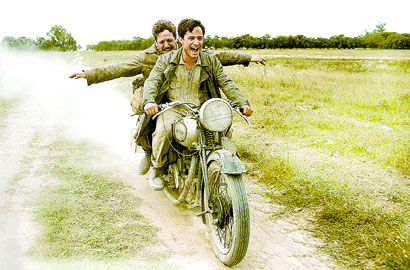A wonderfully shot film provides visual, not political, roadmaps
When is a film about Che Guevara not really about Che Guevara? When it’s “The Motorcycle Diaries,” a buddy movie about two guys who go on a road trip through South America in the 1950s, one of whom expresses some political opinions from time to time.
Imagine a South African remake of “American Pie” in which one of the horny teens is the young Nelson Mandela, and you’ve got the picture. “The Motorcycle Diaries” is based on the writings of Guevara and his traveling companion Alberto Granado, but it may as well be complete fiction for all the light it sheds on him. This is radical chic without the radicalism, seemingly geared toward people who find Guevara vaguely admirable but would be turned off by talk of class struggle and revolution.
This isn’t the worst film ever made about Guevara––in 1969, Richard Fleischer made the notorious turkey “Che!” starring Omar Sharif in the title role and Jack Palance as Fidel Castro. However, “Motorcycle” marks the latest stage in Guevara commodification. An icon since the 1960s, his bearded face glowers from the windows of T-shirt shops in the Village. Rage Against The Machine draped banners with that face over their equipment. Rapper Jay-Z wore a Guevara T-shirt when taping his “MTV Unplugged” special.
“The Motorcycle Diaries” could have performed the valuable service of pulling him off his pedestal and treating him as a human being, but it’s more an evasion than a demystification.
“The Motorcycle Diaries” begins in January 1952. Ernesto Guevara (Gael Garcia Bernal) is a 23-year-old medical student. He plans a road trip with his 29-year-old friend Alberto Granado (Rodrigo de la Serna), a biochemist.
The two intend to travel through Argentina, up the west coast of South America and end their trip at a leper colony in Venezuela. (Guevara was particularly interested in leprosy.) Their run-down motorcycle, nicknamed “the Mighty One,” has to be abandoned by the time they reach Chile. They meet a wide spectrum of the continent’s population, from wealthy Argentines to a couple of Peruvian Communists.
De la Serna has the showier part. Granado is a ladies’ man, perpetually flirting with the women they meet, and adept at charming his way into free food and lodging. Guevara is more reserved, physically smaller and more vulnerable. He suffered from constant asthma attacks, but as presented in this context, the affliction becomes a hackneyed narrative device.
Bernal has a quiet intensity, playing Guevara as a sensitive James Dean- type, but the film presumes too much about what’s going on in his head. His performance is a bit too low-key. “ The Motorcycle Diaries” attempts to chart his increasing sympathy with South America’s disenfranchised, especially the indigenous people, but his handful of political outbursts seem to come out of nowhere.
Brazilian director Walter Salles made his breakthrough with another road movie, “Central Station.” While quite popular, it was essentially a tourist’s view of his own country and had an unfortunate tendency to make poverty look picturesque. “The Motorcycle Diaries” continues this trend. His direction and Eric Gautier’s cinematography are conventionally pretty. They never risk making the surroundings come alive as anything other than a backdrop to Guevara and Granado’s journey.
Recent road movies including Lynne Ramsay’s “Morvern Callar” and Vincent Gallo’s “The Brown Bunny” have used travel as a means to explore grief. In “The Motorcycle Diaries,” it merely provides a pat set of challenges to be overcome, life lessons to be learned and goals to be met. The echoes of Alfonoso Cuaron’s “Y Tu Mama Tambien,” which also starred Bernal, don’t help––in its own irreverent way, that film was more trenchant about class and honest about the homoerotic underpinnings of male bonding.
Richard Porton, writing in Cinema Scope magazine, argued, “Salles’ preference for the youthful Guevara over the mature revolutionary may stem from the fact that, once Che and his comrades achieve power in Cuba, it becomes impossible to perform the alchemy of turning him into a Robert Redford liberal.” Indeed, there’s not much about “The Motorcycle Diaries” that doesn’t feel predigested, and too often innocuous. Guevara’s athletic self-actualization toward the end of the film is so corny that it wouldn’t fly in a “Rocky” sequel.
North American filmmakers have severe difficulty, in anything other than documentaries, representing political reality. “The Motorcycle Diaries” suggests the problem may extend throughout the hemisphere.


































